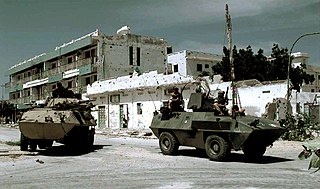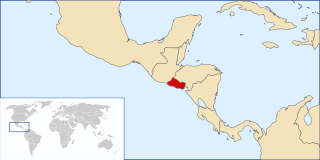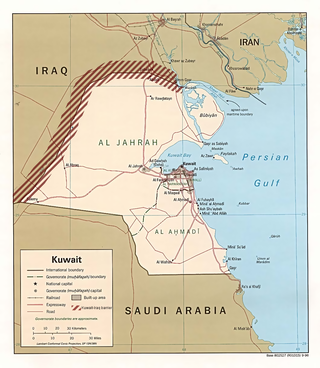ONUCA was a United Nations peacekeeping mission deployed in Central America in 1990 and 1991.

United Nations Security Council resolution 632, adopted unanimously on 16 February 1989, after reaffirming resolutions 431 (1978), 435 (1978) and 629 (1989), the Council endorsed a report by the Secretary-General Javier Pérez de Cuéllar concerning the United Nations plan for Namibia, reiterating its legal authority over the territory until its independence.

United Nations Security Council resolution 644, adopted unanimously on 7 November 1989, after recalling Resolution 637 (1989), the Council endorsed the report by the Secretary-General and decided to establish the United Nations Observer Group in Central America (ONUCA) in accordance with the report.

United Nations Security Council resolution 653, adopted unanimously on 20 April 1990, after recalling resolutions 644 (1989) and 650 (1990), the council endorsed a report by the Secretary-General and authorised new additions to the mandate of the United Nations Observer Group in Central America.

United Nations Security Council resolution 654, adopted unanimously on 4 May 1990, after recalling resolutions 637 (1989), 644 (1989), 650 (1990) and 653 (1990), the council endorsed a report by the Secretary-General and decided to extend the mandate of the United Nations Observer Group in Central America for a further six months until 7 November 1990.

United Nations Security Council resolution 729, adopted unanimously on 14 January 1992, after recalling resolutions 637 (1989), 693 (1991) and 714 (1991), the Council welcomed the conclusion of agreements by the Government of El Salvador and the Farabundo Martí National Liberation Front to bring about an end to the ongoing civil war in El Salvador and the Secretary-General's intention to end the United Nations Observer Mission in El Salvador.

United Nations Security Council resolution 730, adopted unanimously on 16 January 1992, after recalling resolutions 719 (1991) and 729 (1992) the Council approved a report by the Secretary-General from 14 January, and decided to terminate the mandate of the United Nations Observer Group in Central America (ONUCA) with effect from 17 January 1992.

United Nations Security Council resolution 775, adopted unanimously on 28 August 1992, after reaffirming resolutions 733 (1992), 746 (1992), 751 (1992) and 767 (1992) considering a report by the Secretary-General Boutros Boutros-Ghali on the ongoing civil war in Somalia, the Council decided to increase the strength of the United Nations Operation in Somalia I by an additional 3,000 personnel.

United Nations Security Council resolution 784, adopted unanimously on 30 October 1992, after recalling resolutions 637 (1989), 693 (1991), 714 (1991) and 729 (1992), the council approved a decision by the Secretary-General Boutros Boutros-Ghali to extend the mandate of the United Nations Observer Mission in El Salvador (ONUSAL) for a further month until 30 November 1992.

United Nations Security Council resolution 806, adopted unanimously on 5 February 1993, after recalling resolutions 687 (1991), 689 (1991) and 773 (1992) in addition to a report by the Secretary-General Boutros Boutros-Ghali, the council, acting under Chapter VII of the United Nations Charter, guaranteed the inviolability of the international boundary between Iraq and Kuwait measures taken to enforce it, in the aftermath of Iraqi incursions into the demilitarised zone in January 1993.

United Nations Security Council resolution 832, adopted unanimously on 27 May 1993, after recalling resolutions 637 (1989), 693 (1991), 714 (1991), 729 (1992), 784 (1992) and 791 (1992), the council noted a report by the Secretary-General Boutros Boutros-Ghali and enlarged the mandate of the United Nations Observer Mission in El Salvador (ONUSAL) to include the observation of the electoral process.

United Nations Security Council resolution 866, adopted unanimously on 22 September 1993, after reaffirming resolutions 813 (1993) and 856 (1993), the council noted that United Nations involvement would contribute significantly to the effective implementation of the peace agreement in Liberia and went on to establish the United Nations Observer Mission in Liberia (UNOMIL).
United Nations Security Council resolution 950, adopted unanimously on 21 October 1994, after reaffirming resolutions 813 (1993), 856 (1993), 866 (1993) and 911 (1994), the Council noted the deteriorating situation in Liberia and extended the mandate of the United Nations Observer Mission in Liberia (UNOMIL) until 13 January 1995.

United Nations Security Council resolution 1136, adopted unanimously on 6 November 1997, after recalling Resolution 1125 (1997) regarding the situation in the Central African Republic, the Council authorised the continuation of the Inter-African Mission to Monitor the Implementation of the Bangui Agreements (MISAB) mission in the country for a further three months.
United Nations Security Council resolution 1159, adopted unanimously on 27 March 1998, after reaffirming resolutions 1125 (1997), 1136 (1997), 1152 (1998) and 1155 (1998), regarding the situation in the Central African Republic, the council established the United Nations Mission in the Central African Republic (MINURCA).

United Nations Security Council resolution 1171, adopted unanimously on 5 June 1998, after recalling resolutions 1132 (1997), 1156 (1998) and 1162 (1998) on the situation in Sierra Leone, the council, acting under Chapter VII of the United Nations Charter, terminated the arms embargo against the Government of Sierra Leone.
United Nations Security Council resolution 1181, adopted unanimously on 13 July 1998, after recalling all previous resolutions on the situation in Sierra Leone, the council established the United Nations Observer Mission in Sierra Leone (UNOMSIL) to monitor the military and security situation in the country for an initial period of six months until 13 January 1999.
United Nations Security Council resolution 1193, adopted unanimously on 28 August 1998, after recalling Resolution 1076 (1996) concerning Afghanistan, the Council discussed the deteriorating political, military and humanitarian situation in Afghanistan during the ongoing civil war in the country.

United Nations Security Council resolution 1528, adopted unanimously on 27 February 2004, after recalling resolutions 1464 (2003), 1479 (2003), 1498 (2003), 1514 (2003) and 1527 (2004) on the situation in Côte d'Ivoire, the council established the United Nations Operation in Côte d'Ivoire (UNOCI) for an initial period of twelve months.

United Nations Security Council Resolution 1609 was adopted unanimously on 24 June 2005. After recalling previous resolutions on the situation in Côte d'Ivoire, the council extended the mandate of the United Nations Operation in Côte d'Ivoire (UNOCI) and supporting French forces for a further seven months until 24 January 2006.













